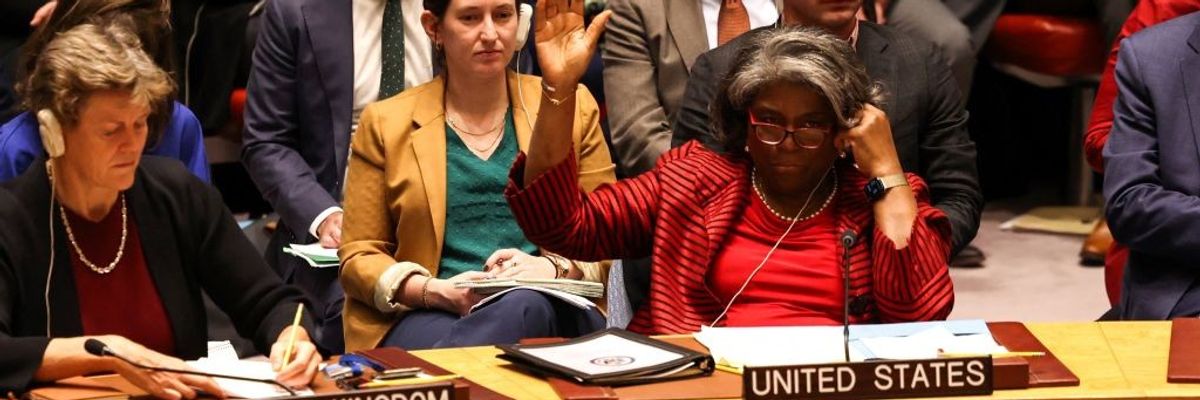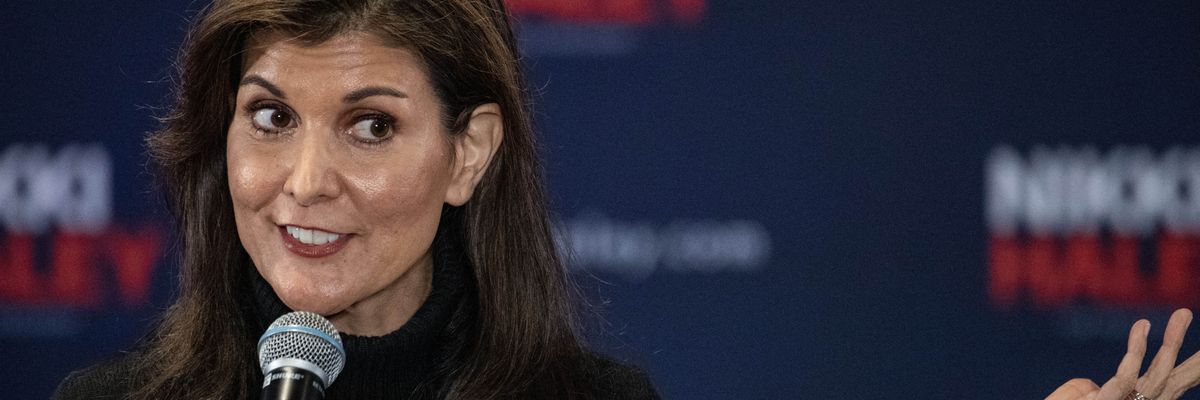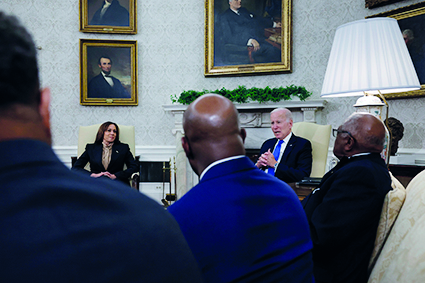"The order books of the world's biggest defense companies are near record highs," a new Financial Times analysis reveals.

Visitors look at the BARAK (top), PAC-3 MSE (middle), and THAAD (bottom) missiles from Lockheed Martin on day one of the Defence and Security Equipment International (DSEI) fair at ExCel on September 12, 2023 in London.
(Photo: Leon Neal/Getty Images)
BRETT WILKINS
Dec 28, 2023
Orders at many of the world's biggest arms companies are "near record highs" due to rising geopolitical tensions in recent years, an analysis published Wednesday by Financial Times revealed.
The London-based newspaper analyzed the order books of the world's 15 top arms makers and found their combined backlogs were $777.6 billion at the end of 2022—a 10% increase from 2020.
According to FT:
The trend's momentum continued into 2023. In the first six months of this year—the latest comprehensive quarterly data available—combined backlogs at these companies stood at $764 billion, swelling their future pipeline of work as governments kept placing orders.
The sustained spending has spurred investors' interest in the sector. [Member of Chartered Institute for Securities & Investment's] global benchmark for the industry's stocks is up 25% over the past 12 months. Europe's Stoxx aerospace and defense stocks index has risen by more than 50% over the same period.
Private equity firms including BlackRock, Vanguard, Capital Group, and State Street are dominant or major shareholders in most of the weapons companies analyzed by FT. These Wall Street speculators are "the ones driving the perpetual wars to maintain their bankrupt financial system," according to the International Schiller Institute, a Washington, D.C.-based think tank.
"In the U.S., the defense budget was $858 billion in 2023, and it is rapidly heading towards $1 trillion per year," the institute said last week. "Meanwhile our highways and railroads, our bridges and tunnels, our hospitals and schools are crumbling. And the rest of the world also desperately needs American technology and capital goods to help their development, working with China and Russia, rather than driving the planet towards World War III against them."
The West's scramble to arm Ukraine's homeland defense against ongoing Russian invasion and occupation played a significant role in surging arms orders.
For example, Hanwha Aerospace, South Korea's largest weapons manufacturer, recorded the biggest increase in new orders—FT says its backlog soared from $2.4 billion in 2020 to $15.2 billion at the end of last year—largely due to sales of K-9 self-propelled howitzers to countries supplying arms to Ukraine.
Rheinmetall, a German firm that makes Panther main battle tanks, nearly doubled its backlog from $14.8 billion to $27.9 billion, also in large part because of Ukraine-related sales.
However, many of the company's swollen backlogs predate the Ukraine war, which began in February 2022.
"The reality is lead times for policymaking, budgets, and placing orders are so long that the invasion of almost two years ago is only just appearing in orders and barely in revenues, except for a few shorter-cycle specialists such as Rheinmetall," Nick Cunningham, an analyst at the insurance firm Agency Partners, told FT.
Israel's assault on Gaza—which began in October and is already one of the most devastating in modern history, with an average of 1,000 bombs dropped daily on the densely populated strip—is not included in FT's analysis, but is a boon to arms-makers and a large part of the reason why last year's record backlogs are expected to reach new heights in 2023 and beyond.
As Common Dreams reported earlier this year, global military spending rose to an all-time high of over $2.2 trillion last year, according to the Stockholm International Peace Research Institute.

Photograph Source: Michael Shvadron, Israel Defense Forces – CC BY 2.0
The Bank of Israel Governor Amir Yaron is worried. He is keeping an eye on the ballooning costs of his country’s war against Gaza and the Palestinians. Initially, the Netanyahu government promised to increase its defence budget by NIS 20 billion (US$5.48 billion) per annum in the aftermath of the war. But a document from the Finance Ministry presented to the Knesset Finance Committee on December 25 suggests that the number is NIS 10 billion greater.
The Finance Ministry is also projecting that the war against Hamas will cost the country’s budget somewhere in the order of NIS 50 billion (US$13.8 billion). NIS 9.6 billion will go towards such expenses as evacuating residents close to the borders of the country’s north and south, buttressing emergency forces and rehabilitation purposes.
The increased military budget is predictable and in keeping with the proclivities of the Israeli state. What is striking is that Prime Minister Benjamin Netanyahu has regarded Israeli defence expenditure as generally inadequate when looked at as a percentage of gross domestic product (GDP). Between 2012 and 2022, military expenditure as a percentage of GDP fell from 5.64% to 4.51%. Doing so enables him to have two bites at the same rotten cherry: to claim he was blameless for that very decline in military expenditure, and to show that he intends to rectify a problem he was hardly blameless for.
Even in war time, Netanyahu is proving oleaginous in his policy making. The mid-December supplementary budget for 2023, coming in at NIS 28.9 billion, was intended to cover the ongoing conflict with Hamas and Hezbollah. But its approval was hardly universal. Opponents of the budget noted the allocation of hundreds of millions of shekels towards “coalition funds” intended for non-war related projects relevant to parliamentarians and ministers. Benny Gantz’s National Unity party, a coalition partner, would have nothing to do with it. Intelligence minister Gila Gamliel was absent from the vote, while Yuli Edelstein of Netanyahu’s own Likud Party abstained. Opposition leader Yair Lapid pointed the finger at the rising budget deficit.
On December 18, Yaron gave vent to some of his concerns. “During this period, more than at any other time, and as investors, rating agencies, financial markets and the public as a whole are carefully examining policymaking in Israel, it is necessary to manage economic policy – fiscal and monetary – with great responsibility.”
Body counts interest Yaron less than budget figures and reputational damage in the markets, though killing Palestinians is proving an expensive business. “The government will have to find the right balance between financing war expenses and the expected increase in the defence budget and the need to continue investing in other civilian budgets, which are already low, in particular in growth engines such as infrastructure and education.”
Yaron has every reason to assume that costs will continue to balloon. For one thing, Netanyahu’s idea of peace in the current conflict reads like a blueprint for ongoing, lengthy massacre, accompanied by permanent mass incarceration: the destruction of Hamas itself, the demilitarisation of Gaza and a Palestinian society free of radical elements. This is a nightmare to both humanitarians and the belt-tighteners in the Finance Ministry.
Notably, the plan says nothing about Palestinian statehood, which, in the scheme of Israel’s aims, has been euthanised. Gaza, the designated monstrosity Israel nourished as a supposedly useful tool to keep Palestinian ambitions in check, is to be turned into a prison entity that seems awfully much like it was prior to the October 7 attacks by Hamas. (The cruel, in such cases, lack imagination.)
A “temporary security zone on the perimeter of Gaza and an inspection mechanism on the border between Gaza and Egypt” will be established in accordance with “Israel’s security needs”. The zone will also serve to prevent “smuggling of weapons into the territory”, which sounds much like the original blockade, lasting 14 years, that was meant to achieve the same purpose.
The Israeli PM is, however, promising that the destruction of Hamas will take place “in full compliance with international law”, begging the question what sort of international law he is consulting. Given various official statements from Netanyahu’s cabinet and the Israeli Defence Forces, it must be either a law of jungle provenance or one applicable to animal kind. That same standard of legal analysis has permitted the generously expansive massacre of over 20,000 Palestinians, a staggering number of them children, the ongoing flattening of Gaza, and the utter destruction of critical infrastructure.
Given that Israeli law, alongside military and administrative policy, does nothing other than encourage the radicalisation of Palestinians and the fertilising of the Jihadist soil, this is charmingly delusionary. The current war will simply prove to be the same as previous ones, protean, adjustable, and shape changing. Conflict will simply continue by other means, a continued growth of flowering hatreds, leaving Israel a butcher’s bill of shekels and casualties it is only now chewing over.





 TALKS: US President Joe Biden and Vice President Kamala Harris host a meeting with members of the Congressional Black Caucus (Photo by Chip Somodevilla/Getty Images)
TALKS: US President Joe Biden and Vice President Kamala Harris host a meeting with members of the Congressional Black Caucus (Photo by Chip Somodevilla/Getty Images)



